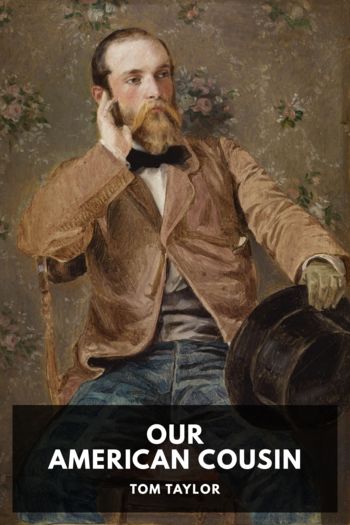Struggles and Triumphs, P. T. Barnum [good books to read in english .txt] 📗

- Author: P. T. Barnum
Book online «Struggles and Triumphs, P. T. Barnum [good books to read in english .txt] 📗». Author P. T. Barnum
After they had been a week in the Museum, I proposed a change of performance for the week following, by introducing new dances. Among these was the Indian Wedding Dance. At that time I printed but one set of posters (large bills) per week, so that whatever was announced for Monday, was repeated every day and evening during that week. Before the Wedding Dance came off on Monday afternoon, I was informed that I was to provide a large new red woollen blanket, at a cost of ten dollars, for the bridegroom to present to the father of the bride. I ordered the purchase to be made; but was considerably taken aback, when I was informed that I must have another new blanket for the evening, inasmuch as the savage old Indian Chief, father-in-law to the bridegroom, would not consent to his daughter’s being approached with the Wedding Dance unless he had his blanket present.
I undertook to explain to the chief, through the interpreter, that this was only a “make believe” wedding; but the old savage shrugged his shoulders, and gave such a terrific “Ugh!” that I was glad to make my peace by ordering another blanket. As we gave two performances per day, I was out of pocket $120 for twelve “wedding blankets,” that week.
One of the beautiful squaws named Do-humme died in the Museum. She had been a great favorite with many ladies—among whom I can especially name Mrs. C. M. Sawyer, wife of the Rev. Dr. T. J. Sawyer. Do-humme was buried on the border of Sylvan Water, at Greenwood Cemetery, where a small monument, erected by her friends, designates her last resting place.
The poor Indians were very sorrowful for many days, and desired to get back again to their western wilds. The father and the betrothed of Do-humme cooked various dishes of food and placed them upon the roof of the Museum, where they believed the spirit of their departed friend came daily for its supply; and these dishes were renewed every morning during the stay of the Indians at the Museum.
It was sometimes very amusing to hear the remarks of strangers who came to visit my Museum. One afternoon a prim maiden lady from Portland, Maine, walked into my private office, where I was busily engaged in writing, and taking a seat on the sofa she asked:
“Is this Mr. Barnum?”
“It is,” I replied.
“Is this Mr. P. T. Barnum, the proprietor of the Museum?” she asked.
“The same,” was my answer.
“Why, really, Mr. Barnum,” she continued, “you look much like other common folks, after all.”
I remarked that I presumed I did; but I could not help it, and I hoped she was not disappointed at my appearance.
“Oh, no,” she said; “I suppose I have no right to be disappointed, but I have read and heard so much about you and your Museum that I was quite prepared to be astonished.”
I asked her if she had been through the establishment.
“I have,” she replied; “I came in immediately after breakfast; I have been here ever since, and, I can say I think with the Queen of Sheba, that ‘the half had not been told me.’ But, Mr. Barnum,” she, continued, “I have long felt a desire to see you; I wanted to attend when you lectured on temperance in Portland, but I had a severe cold and could not go out.”
“Do you like my collection as well as you do the one in the Boston Museum?” I asked.
“Dear me! Mr. Barnum,” said she, “I never went to any Museum before, nor to any place of amusement or public entertainment, excepting our school exhibitions; and I have sometimes felt that they even may be wicked, for some parts of the dialogues seemed frivolous; but I have heard so much of your ‘moral drama’ and the great good you are doing for the rising generation that I thought I must come here and see for myself.”
“We represent the pathetic story of ‘Charlotte Temple’ in the Lecture Room today,” I remarked, with an inward chuckle at the peculiarities of my singular visitor, who, although she was nearly fifty years of age, had probably never been in an audience of a hundred persons, unless it might be at a school exhibition, or in Sunday school, or in church.
“Indeed! I am quite familiar with the sad history of Miss Temple, and I think I can derive great consolation from witnessing the representation of the touching story.”
At this moment the gong sounded to announce the opening of the Lecture Room, and the crowd passed on in haste to secure seats. My spinster visitor sprang to her feet and anxiously inquired:
“Are the services about to commence?”
“Yes,” I replied, “the congregation is now going up.”
She marched along with the crowd as demurely as if she was going to a funeral. After she was seated, I watched her, and in the course of the play I noticed that she was several times so much overcome as to be moved to tears. She was very much affected, and when the “services” were over, without seeking another interview with me, she went silently and tearfully away.
One day, two city boys who had thoroughly explored the wonders of the Museum, on their way out passed the open door of my private office, and seeing me sitting there, one of them exclaimed to his companion:
“There! That’s Mr. Barnum.”
“No! is it?” asked the other, and then with his mind full of the glories of the stuffed gander-skins, and other wealth which had been displayed to his wondering eyes in the establishment, he summed up his views of the





Comments (0)